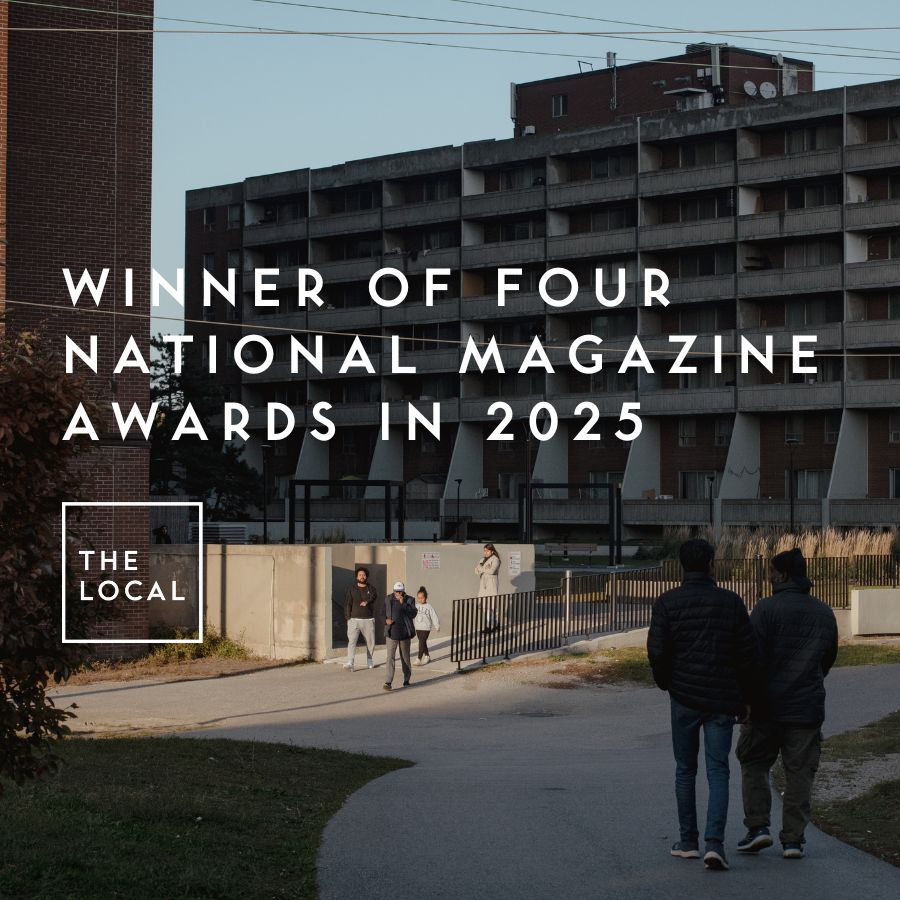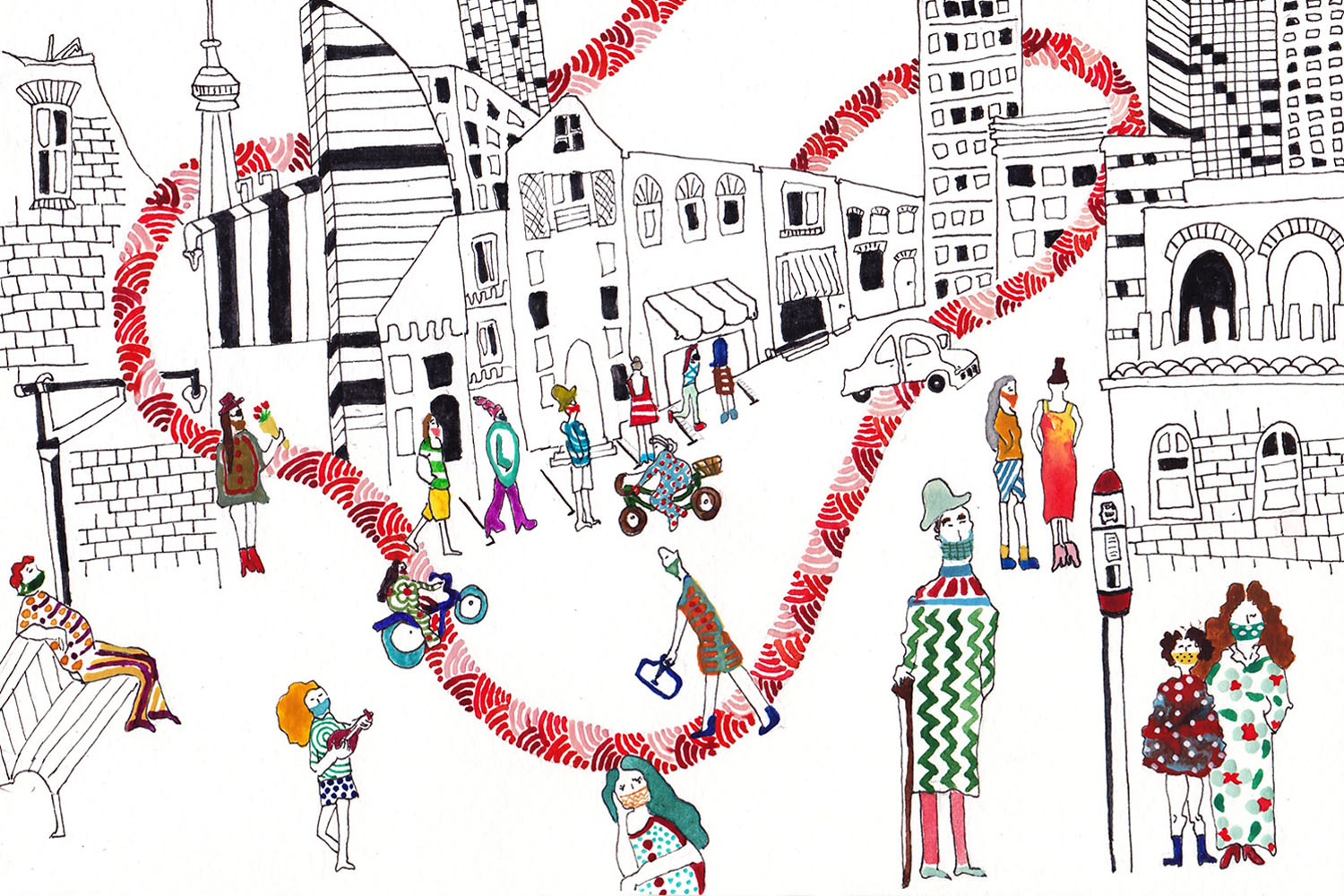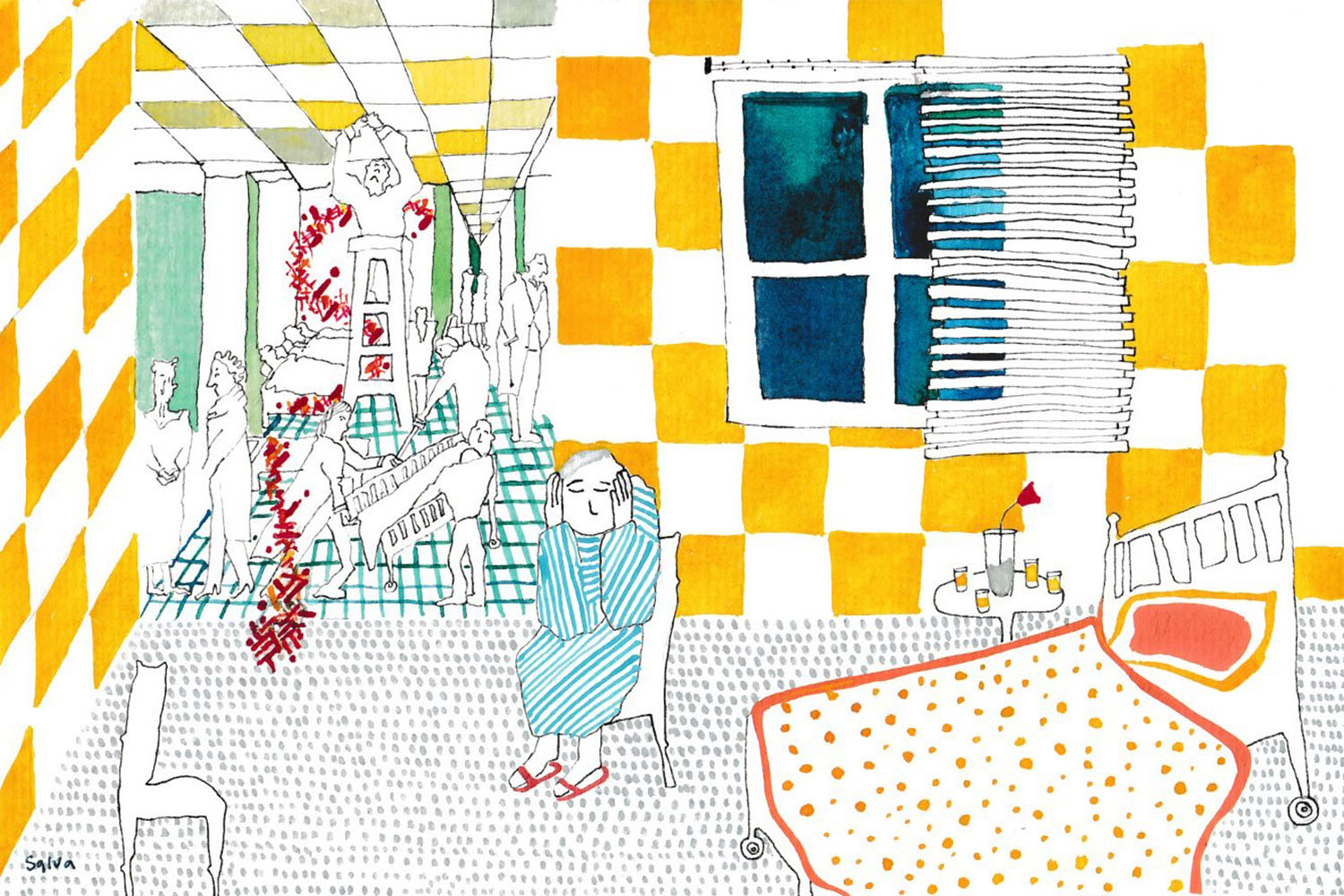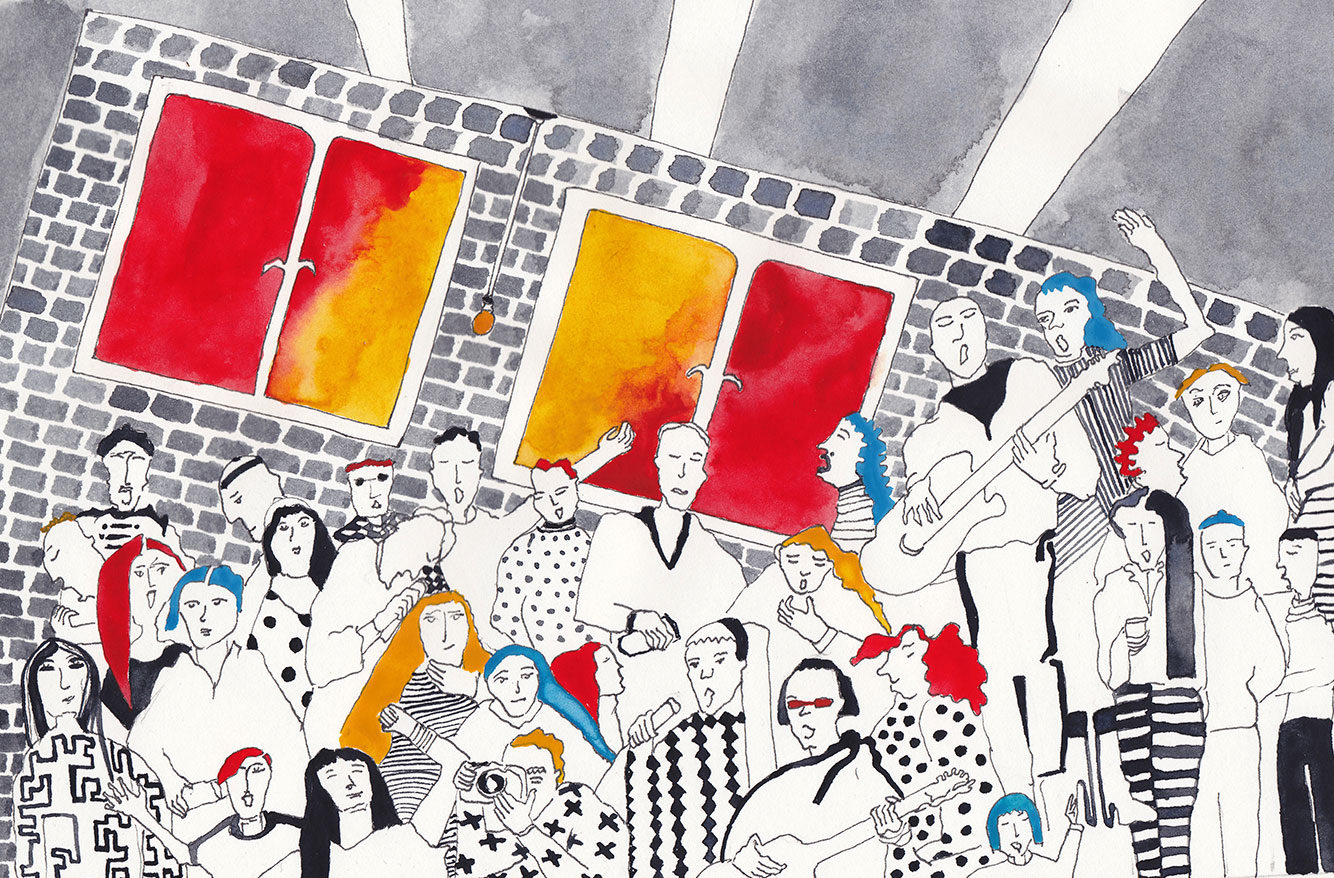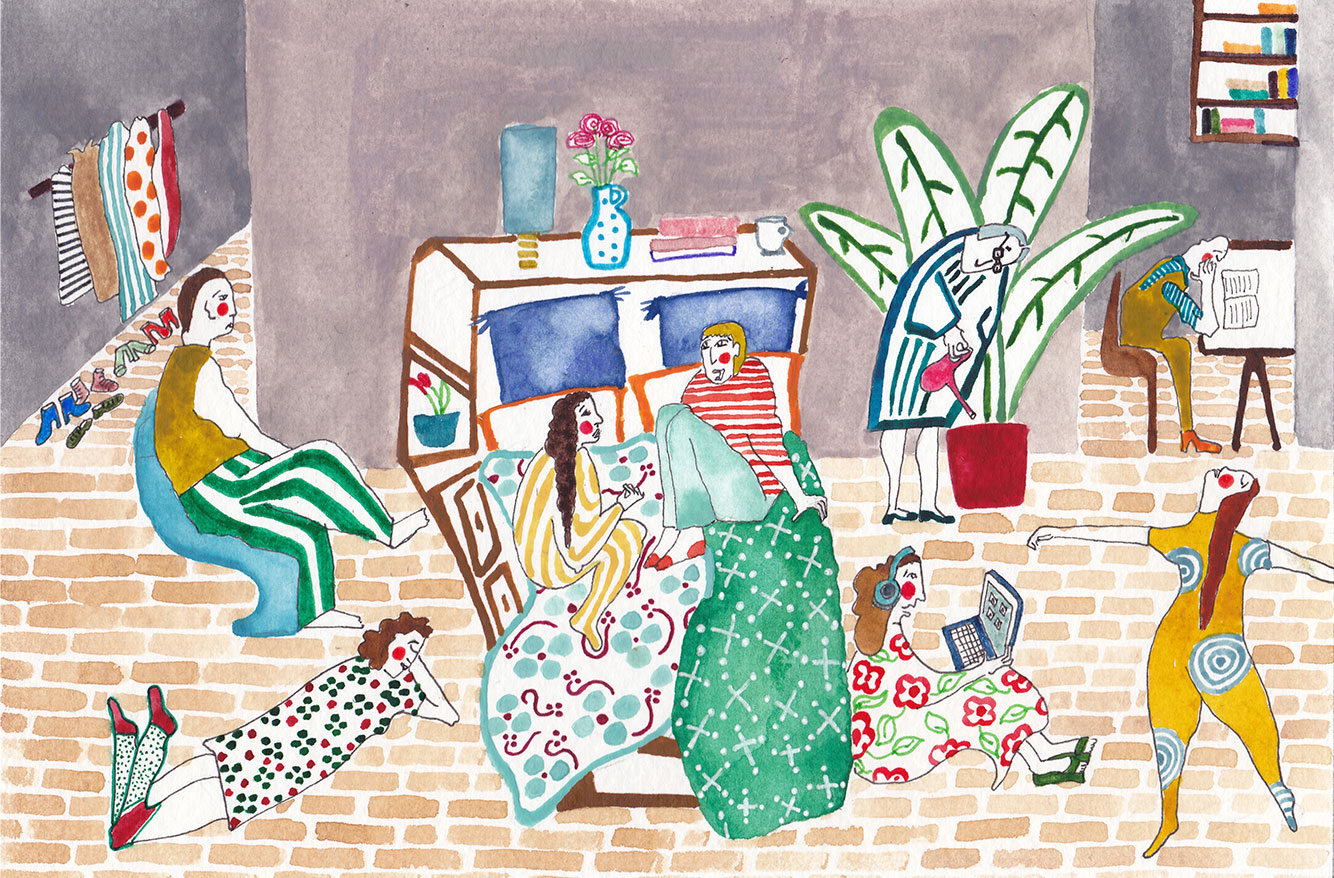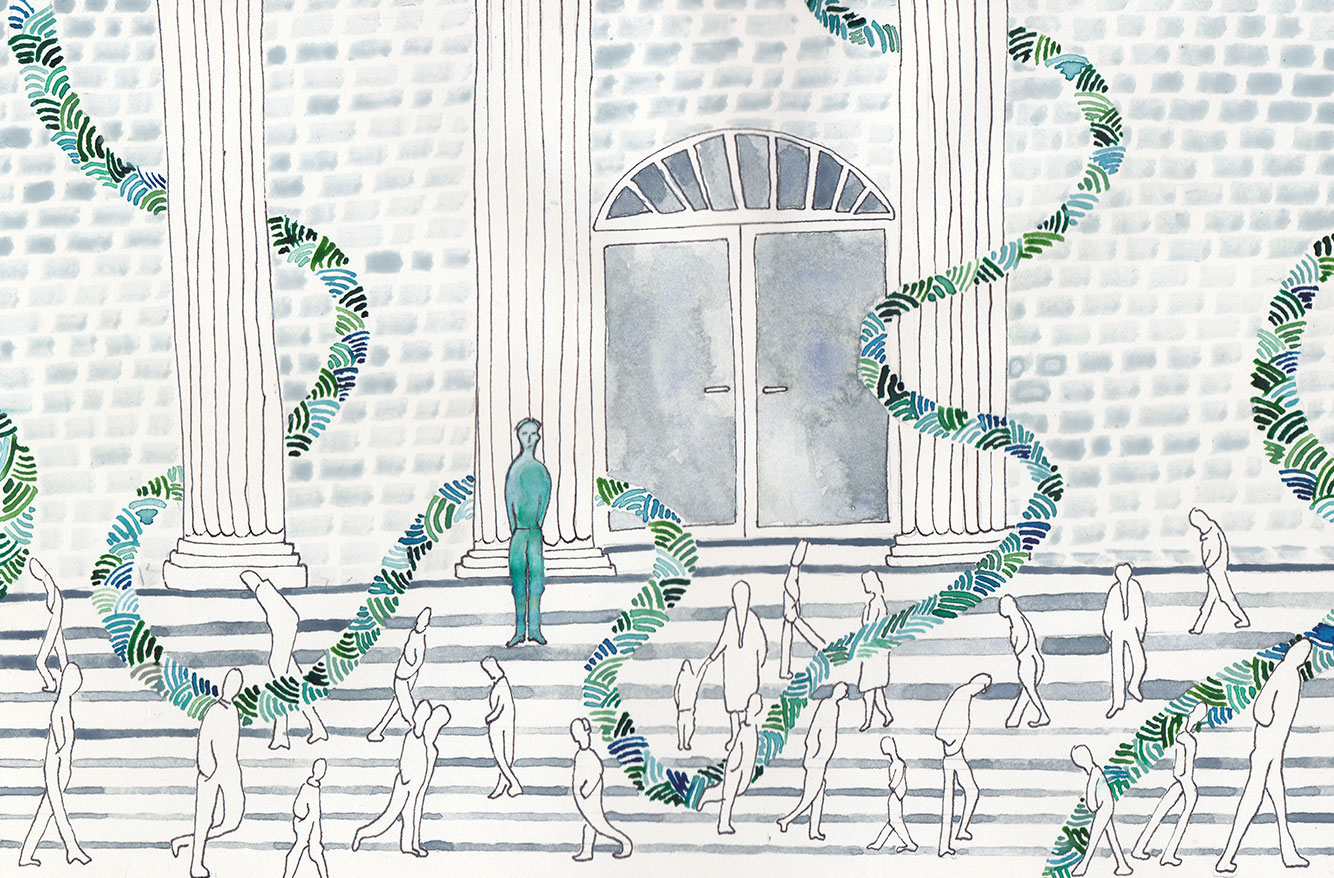
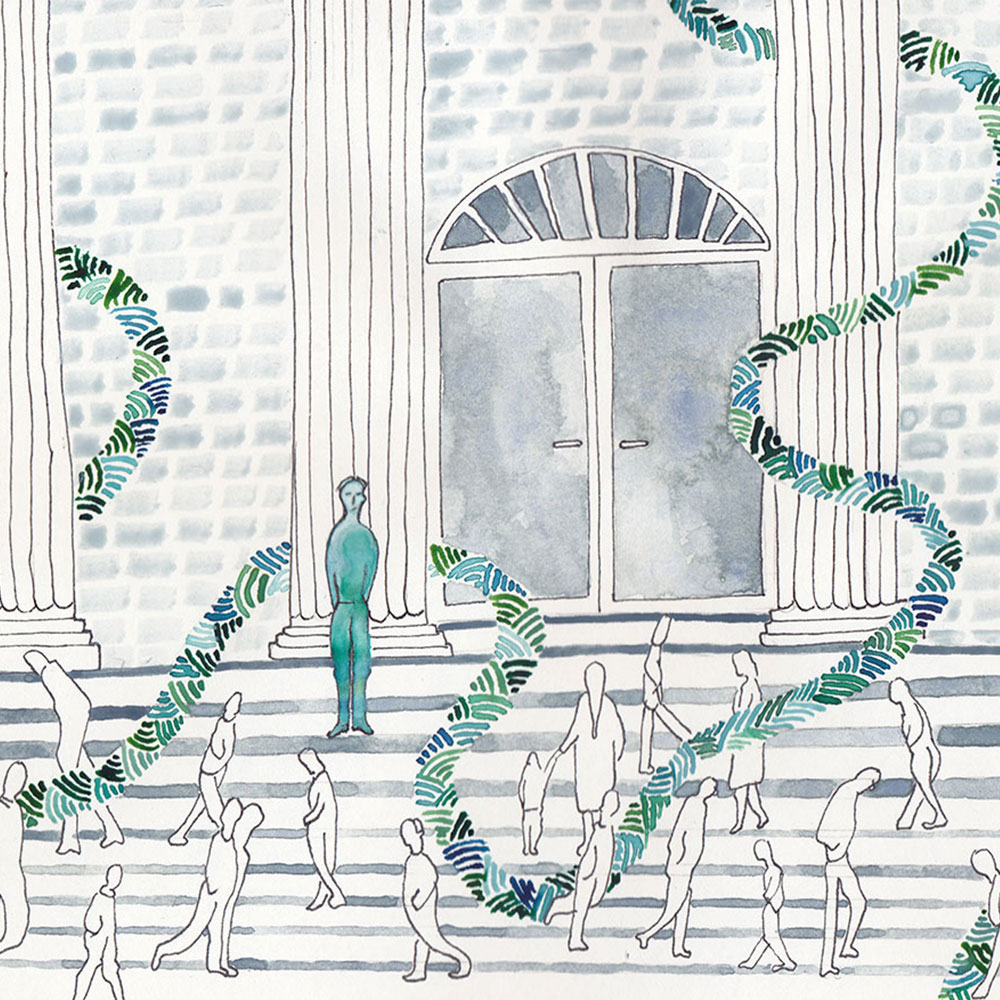
Do you remember what April sounded like? Do you remember those rare moments where you ventured from the safety of home, your breath hot inside the cloth of the mask that didn’t yet feel normal?
I remember standing at the lip of Christie Pits, the furthest I’d been willing to stray from my apartment for weeks. An intersection that had forever been busy with the violent sounds of traffic held nothing. My breath, my heartbeat, the feeling of wind. In that stage of the shutdown, being in the city was like being in another dimension. We were all removed, all separate. We were floating through a world with the music that informs our lives suddenly missing.
With the sudden loss of worldly contact, it felt to me like we were not here at all.
But this was not a new feeling.
***
“Are you here?” someone asks. I make out the words, though it’s hard. I can’t tell who is asking because the voice is coming from my right, and I struggle with voices to my right.
I reach up to the side of my head and slip the plastic half-moon nestled there from its place. The plastic of my hearing aid is old enough now for me to feel bumps and scrapes along the black paint of its side. I have permanent, profound sensorineural hearing loss in my right ear, which means I was born with the structure of my inner ear damaged, unable to fulfill its function. I can still hear, and so don’t claim space in the Deaf community or it’s culture. But without the hearing aid I can come unstuck, plunging below the surface layer of Toronto into the city that lies beneath—a place full of monstrous shapes and shadowy figures, where clarity is only found in small moments of concentration, as I lean in to listen with my brow furrowed and neck crooked. I didn’t know then that my balancing line between different cities was the same line between a pre- and post-pandemic world, where everyone is forced to join me in a dimension of muted sound.
“Just a moment,” I say. It’s a hot July evening in 2019 and I’m sitting on the deck of Station Cafe and Kitchen at the corner of Ossington and Bloor. Cars moan to each other as they journey past. People are only just beginning to stumble from the bars into the grassy embrace of Christie Pits Park down the road. Boxes of paperbacks sleep between my feet. They are as of yet silent, unopened, mine. Though my book was released nearly a month earlier, there had yet to be any real opportunity for me to hold them in my hands in front of people, to press the sounds of my voice over what is printed on the page.
My hearing aid whistles as it comes free, a high-pitched whine that complains of displacement. I’ve operated with a hearing aid since I was five. I often tell people it’s like wearing glasses smudged by fingerprints and ageing scratches—better than no glasses at all, but not a one-to-one replacement.
But yes, it helps. Until I was five, I didn’t know that birdsong could be heard from the streets. The hearing aid helps me stay closer to the surface, though I can’t always break through. When I take it off, or when it dies, or when I’m just overwhelmed, it’s like I’ve taken one foot out of the reality you know, my hearing dragging my other senses down until it feels like I’m seeing, touching, tasting, and speaking through a thick veil of water.
This isn’t a binary of hearing or not-hearing. The other reality I travel is still full of noise. Imagine standing behind a waterfall, trying to separate the sounds of each droplet of water from the unified downward crescendo.
When I’m travelling between these two Torontos, I think I must look like I’m far away, the way people look when they learn to dream without closing their eyes. Because you are always asking: “Are you here? Are you here?”
“I just need to change the battery,” I say, holding my expensive tether to the surface between my forefinger and thumb. “But I’m still here.”
***
“I’m here,” I say, even if I can’t hear the question.
When I can’t make out words, I can still make out tones, the way you hear the muted melodies of voices from the other side of a wall. I learn to read the shapes of the sounds of those I know well, to play the murky game of communicating from the City Below to the City Above. To say sorry or what was that or could you say that again is to lose. To be told a second time, or to hear never mind or I’ll tell you later is to be crushed.
Sometimes I do get it wrong, though, allowing communication through miscommunication.
“I love you too,” I said once to my partner at the corner of Queen and Bathurst while we waited for the streetcar, snowflakes finding homes in our upturned eyelashes. She’d only said “hello.” We laughed together. That wasn’t so bad.
Other times are worse. I am constantly mishearing, and it fuses to anxiety. I might hear a colleague insult me, or a teacher threaten me, but more likely what I hear makes no sense at all, jumbles of words becoming gibberish. And oftentimes, for strangers and for crowds, I say nothing at all.
I smile and nod. To play the guessing game, I have to really know someone. It’s hard to know someone you can never hear.
One of the strangest gifts of the pandemic is the gift of small gatherings. On the few occasions when I see people, socially distanced in patios or parks, I know that the crescendo of background sounds in an enclosed space won’t be a problem. I know, too, that there won’t be too many people for me to handle.
But in my rare in-person interactions with the outside world, I find myself surprised by how much the veil of sound has become literalized in a world where everyone is in masks. I never thought that reading lips was a part of my guessing game, but now I think it must be. I am at even more of a loss without the assistance of watching the wonderful motions of communication, while the shape and volume are muffled for the sake of safety.
When I was little, I didn’t understand what panic attacks were. In those moments of rush and paralyzing adrenaline, I thought it was something connected to my hearing loss. I wasn’t exactly wrong.
***
Did I interrupt? Did I talk over you? Did I shout? I’m sorry. I’m not trying to be rude. It is not that I do not care what you have to say. It is just that I cannot hear you. I’m not in the same dimension you are right now.
***
Often, I have struggled to think of myself as disabled. But my disability has helped shape me. I don’t see it as something separate from me. I am my body, and deafness is a part of that body, and it has helped drive this body towards things.
It drove me to read. As a child, I would sit curled at recess with weighty tomes, letting stories dance around me. In reading, I find the clarity that the speaking world sometimes denies me. My disability, too, helped drive me towards the kinds of texts I’ve grown to love. In the fantastical, I see myself. I tumble, ultimately, to the speculative, to science fiction. In those characters searching for something beyond themselves, I see myself. In those cyborgs, whose technologies have become key to their mobility in the world, I see myself. I am my own kind of plug-in cyborg.
In reading, there’s no veil, no separation of spaces. In writing, there is no divide between the world above or below. I am grateful for this. Though we are separated, we can still instantly reach each other through writing. It is its own third dimension we step into together.
***
In Station Café and Kitchen, a friend helps me set up the speaker system. This is still a few hours before the only reading I’ve ever organized for myself. At the time, it felt like I’d rushed that book out the door, midwifing the pages into reality perhaps before they were ready. But now, I’m grateful that I was given that chance to physically carry it through the city into spaces and encounters of sound.
Spare a thought now for those whose words are greeting the world in a greater silence than before.
I test the speakers I’ve carried there myself, in a low voice.
“Is anybody here, here, here?” I say, enjoying the reverb of the near-empty room. Most people are hours from arrival. My friend gives me the thumbs up.
“I thought that was good, what do you think?” they ask.
What do I think?
I think my jokes and comments into companions’ ears at public galleries and city libraries are whispers, not shouts. I believe my mumbles in classrooms are audible. I think my indoor speaking voice cannot be heard streets away.
I apologize for the noise; I can never tell what kind I’m making. Please, allow me to modulate. Please, tell me when I am speaking comfortably.
***
In louder times, I would often take my hearing aid out in the streets. The strain for understanding can be exhausting, so I sometimes preferred to dive into my own daydreams in the City Below. I would simply leave it in my pocket, saving batteries until there was something worth hearing again.
My deafness has driven me to a particular cognition of the Toronto through which I move. The Toronto I see is one single living thing that murmurs, that peers back at me with buildings that gleam and streets that breathe. The endless noise makes the city a body forever waking up, always increasing in volume, still clumsy in its movements, still in the process of becoming. This is the Toronto that I put into my work, the only real reoccurring character in so much of my fiction.
Once, I remember latching onto one set of vocals pulling into Royal York Station: a man singing the theme song to Sesame Street. Such moments are shocking because in the interludes between them it’s possible to forget that the many moving shadows in the dimension I’m moving through are people with their own interiors, not autonomous features of the city.
It’s easiest to forget on my bicycle, when cars and people alike become aliens on my periphery. Often, gliding down the side streets between Bloor and Queen West, I sing to myself. I forget that my voice can be heard outside my body. My bicycle and I are a union untouched by pandemic or lockdown or seasons.
During this strange spring, I wondered how it must sound for those still inside, sitting by open windows in a silent city for the first time. I imagine the strangeness of my body zipping by on moonlit streets, my voice bouncing from the trees in my wake, unimpeded by the other grumbling noises of transport that would usually smother my awkward vocals. A human voice interrupting, ringing across cold dimensions.
***
“Ben? Are you here?”
“I’m here, I’m here.”
I’m drunk because I’m scared, which does not make understanding come easier. But I move now through a wash of familiar tones. Station’s long room has filled up with friends and family, some of whom I’m almost surprised to see clutching the soft red paperbacks I have brought to share, created out of my manic quest for understanding.
I stand, not quite close enough to kiss the mic, and at first, my words are fumbling as I try to read. I thank people for being there with me. I let a hush fall, and let my voice fill it.
And suddenly, there are no shadows. I look up as I read, as I paint an image of the Toronto that is in my mind with words I have slaved over. I see no shadows. I draw everybody in with me, into my dimension.
Here, with written words, we understand each other. This is still true. I am reaching you through your screens. You are reaching me. In reading we find the perfect clarity of connection and communication. In writing we continue to share space with one another, to listen, to be heard, and to feel the company and sounds of the city, even in lockdown.
I am here, in the city above and below. You are here too.
And here we remain together.
